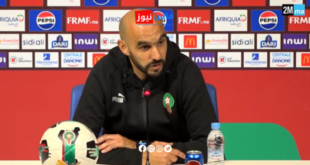In a significant development in the Moroccan political scene, Mohamed Nabil Benabdallah, the Secretary-General of the Party of Progress and Socialism, revealed that the opposition within Parliament is once again considering the possibility of submitting a motion of censure to oust Prime Minister Aziz Akhannouch’s government. This move could reshape the political landscape as the 2026 legislative elections approach.
Benabdallah made these statements during his participation in a political seminar organized by the Higher Institute of Management in Casablanca on Tuesday, under the theme: “Political Opposition and Participation in Decision-Making: What Role in Building Political Balance in the Country?”. During the seminar, he discussed the challenges faced by the opposition and the shortcomings in the government’s performance.
The Secretary-General of the Party of Progress and Socialism confirmed that the opposition still retains its constitutional and political right to resort to a motion of censure. He considered that the current context is more mature than the previous attempt, which failed due to a lack of sufficient coordination between opposition components. He explained that differences in vision and political judgment were among the main reasons that prevented the activation of the initial initiative, which had started with the Socialist Union.
Benabdallah noted that the opposition is fully aware of the challenges it faces, but is working to overcome them through more coordination and providing tangible alternatives, within the framework of respecting political and ideological pluralism among its components.
Benabdallah directly criticized the government’s performance, accusing it of a “lack of cohesion” in managing economic issues, particularly concerning import support and basic goods. He stated that the contradictions in statements between the components of the majority about customs duties and financial support weaken the government’s credibility with the public.
He added that these contradictions not only signal poor coordination but also create ambiguity in public policies, necessitating the activation of parliamentary accountability mechanisms and intensifying political pressure to demand clear answers from the government.
In his speech, Benabdallah reiterated the need to form a fact-finding committee on the budgets allocated for import operations, given the conflicting data circulating about support figures. He called on the parliamentary majority to support this initiative as a legitimate oversight tool that would enhance transparency and build trust between the state and citizens.
He pointed out that ignoring these demands would give rise to more doubts and fuel rumors at a time when social pressures and rising prices are intensifying.
On the other hand, Benabdallah rejected the idea of holding the opposition accountable for responsibilities outside its scope, emphasizing that its role cannot substitute for the government’s duties but rather complements it through oversight and evaluation. He noted that some voices are calling on the opposition to achieve what the government has failed to do, which contradicts the principles of constitutional balance.
He confirmed that despite the opposition’s varying backgrounds, it has made joint amendments and proposals, including suggestions for the finance bill, within what he described as a “gradual political maturity” that should be supported, not undermined.
Benabdallah’s statements come amid a politically tense and reflective atmosphere, with the next elections approaching. This raises many questions about the opposition’s ability to leverage this period to offer realistic alternatives and rebuild trust with citizens.
Source: Fes News Media
 فاس نيوز ميديا جريدة الكترونية جهوية تعنى بشؤون و أخبار جهة فاس مكناس – متجددة على مدار الساعة
فاس نيوز ميديا جريدة الكترونية جهوية تعنى بشؤون و أخبار جهة فاس مكناس – متجددة على مدار الساعة















